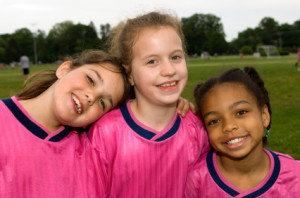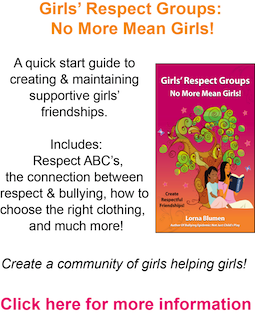Note: A shorter version of this article was posted on the TVOParents.org blog in Aug 2013
********************************************************
Respect for self and others drives all our important life decisions – the friends we choose, the opportunities we reach out to (or hide from), how we recover from setbacks and disappointments, and as we get older, how we approach school, work, and romance. Surprisingly, the best time to build a strong foundation of respect is early – when kids are under 10. And while there’s a big difference between a 4-yr old and a 10-yr old (or even between two 10-yr olds), their underlying goals – building competence, confidence, and independence – are surprisingly similar. Let’s look at why respect for self and others is such a fundamental skill, then look at some practical tips for parents and kids.
Why focus on self-respect in young children? Self-respect from childhood is the scaffold for strong self-respect through the challenging teen years, when kids start making choices on their own, with lots of peer influence. Believe it or not, parents of 4-yr olds are already starting to help their kids build the foundation for skills to help them navigate the preteen years safely.
Children’s self-esteem takes a major hit in the preteen years, plummeting at age 10 for boys and girls, but girls’ self-esteem drops twice as far. What a tough start to the preteen and teen roller coaster! Physical, social, and emotional factors combine in a triple negative of self-respect erosion. The chaos of a teen brain under construction plus unstable self-respect puts kids at high risk for bad decisions and bad consequences during the teen years.
We can’t fully protect our kids from teen turmoil, nor would we want to. Those struggles produce a complex, capable young adult. But we can give our children the best possible preparation while they’re young by teaching them our core values, especially respect for self and others. This solid grounding will help kids make better choices and bounce back faster when a mistake or problem occurs. Psychotherapist Nathaniel Branden, a self-esteem specialist, calls self-esteem “the immune system of the spirit”.
Children need practice making decisions. The more we encourage our children to know themselves, trust their decision-making, and correct their own mistakes (with some help), the better prepared they’ll be to make good (or better) choices, at school and with friends, when parents aren’t around. Parents naturally want to protect our children from mistakes and hurt, but we can’t make every decision, tell kids what to think at every opportunity, then shove them out the door to middle school, university, first apartments and jobs, saying “Bye, bye. You never made a decision in your life. Hope you make good decisions now – about friends, school, romance, sex, drinking, jobs …” We do not want our kids making their first independent decisions in a dorm or apartment, surrounded by hundreds of teens, with no adults in sight! Kids need lots of practice and the opportunity to make some mistakes when the stakes are low and they’re still under watchful adult eyes.
Daily life offers many opportunities. Every parent of a 4-yr old has had the frustrating experience of trying to stuff their uncooperative child into a snowsuit (or coat or rain gear). Toasty warm inside, our preschooler has no idea it’s below freezing on the other side of the door and is unwilling to don coats, boots, hats, and mitts. Commence stuffing!! Or how about, “I’m cold. YOU put on a sweatshirt” or “Here’s your lunch. Eat it all.”
A kid who always needs someone else to tell them how they feel or what to do will be ill-prepared to make decisions on their own. Even worse, they may choose the decision they know their parents would hate the most (“Now that I can choose, I’m never wearing a coat!”).
Solution: Teach kids how to make decisions. “Open the door and check the temperature.” “Look at the thermometer or the Weather Channel.” “How hungry are you – 1 scoop or 2?” Yes, it takes a bit more time to enlist our child’s self-evaluation – add it to the list of the “inefficiencies” of parenting! Our goal, however, is for our kids to learn how to make these decisions on their own, eventually needing less help and time from us. We’re paving the way for our kids to learn how to evaluate and think critically. The road to independent thinking and living starts long before kids (or parents) are ready to leave home.
Am I saying 4-yr olds should dress themselves for winter weather with no advice? No! Kids need to learn how to gather the info needed to make the decision. Check themselves (“Am I hot or cold now?”), check the weather (“Is it hot, cold, or wet outside?”), and internalize the guidelines for how to choose clothing based on that info. It’s also a great opportunity to learn about other factors affecting the choice (“Hmm, sometimes there’s no choice. If I’m sick or just had an ear infection, and it’s below freezing, I need a coat”).
Leave some time for mistakes and watch your kids’ skill level grow. Bring the snowsuit with you – there will be a few “Oops, it’s colder than I thought” moments, but soon it will be your child’s job to bring the snowsuit with them as you head out the door and better decisions will be made before leaving the house. Start this approach on weekends or vacations, when departure time isn’t so crunched, and build it into your routine. Do some prep the night before. You’ll start by needing a few minutes more, but within weeks parents will have more free time in the hectic mornings, as each of your children is empowered to make appropriate decisions and take action within the framework you’ve created. They will be dressing themselves and making lunches without you. They will be proud of themselves for the competence they’re developing. And you’ll be able to apply this process to each new skill your child develops.
The more complex decisions will arrive soon enough. You and your kids will now have a framework for making decisions – in some new and gulp-worthy areas. “Hey Mom, there’s a spring break Grade 12 trip to the Caribbean. With no adults. Can I go???” No kidding, this was a real question at my house. Did I know the “right” answer?? Of course I did! But I needed my daughter to figure it out for herself.
A child who knows how to trust her own decision-making skills will have an easier time making tough decisions. One of my best skills as a parent was when I “did nothing.” Making the time and space for my daughter to think and evaluate, over a period of weeks, with a few parental questions tossed in (“What would you do if someone got sick? Does anyone speak Spanish?”), and resisting the urge to jump in with my answer was one of the best things I ever did as a parent. I literally had tears of relief in my eyes when she decided that the spring break trip was too “sketchy.” My daughter showed me she knew how to think, even under deadline and peer pressure.
While you may want to protect your child by making decisions for them, giving your child the gifts of self-respect and independent thinking are the best route to protection. Self-respect comes from giving our children many opportunities to build confidence and competence, not through empty flattery or over-protection.
COMING UP: Part 2 – Self-Respect: Crucial Life Skill For Kids, Teens & Adults
Learn More:
L Blumen, Bullying Epidemic: Not Just Child’s Play , Toronto: Camberley Press, 2011 (Note: Chapt 7 is about respect)
L Blumen, N Evans, & A Rucchetto, Girls’ Respect Groups: An Innovative Program to Empower Young Women & Build Self-Esteem! Toronto: Camberley Press, 2009
N Branden, NathanielBranden.com
R Brooks & S Goldstein, Raising Resilient Children. New York: McGraw-Hill, 2001
N Niemi, “I Matter, You Matter: Defining Self‐Respect vs. Self‐Esteem and Measuring this Critical Youth‐Development Asset,” RespectInstitute.org, Dec, 2012
E Robins & K Trzesniewski, “Self-Esteem Development Across the Lifespan,” Current Directions in Psychological Science, Jun, 2005




1 pings
[…] « Self-Respect: Crucial Life Skill For Kids, Teens & Adults – Part 1 […]